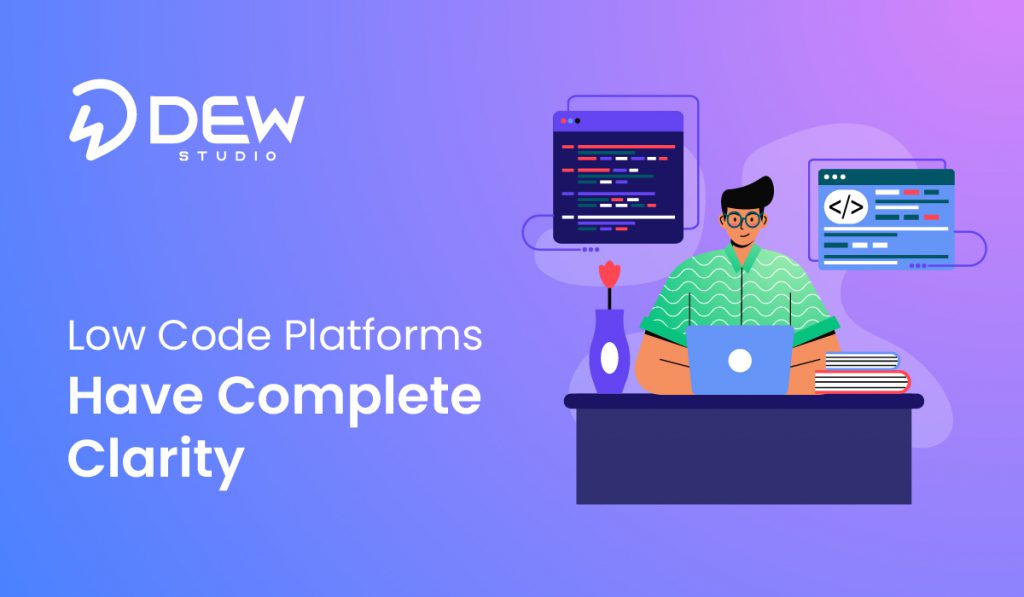To know the viability of the product before attempting to develop it at full scale, enterprises build MVPs. The Minimum Viable Product (MVP) is the yardstick that developers and enterprises use to measure or assess the possible reach of an application.
Many applications may not be successful or even scalable in the future. In that case, the time and resources spent on the application will be wasted. With MVP, we can understand the future possibilities of an application.
MVP is a proof of concept tool that aids creators in validating their concepts. The MVP results assist enterprises in making decisions and investing in their ideas and software applications. Low-code and no-code platform tools aid in the creation of a quick, cost-effective MVP.
“Is this idea worth pursuing?”, “Will this application scale in the future?”, “Is this application market conducive?”: MVP throws light on all these questions.
Impact of Low-code/No-code MVP On Enterprises/Developers
A basic conceptual base app version is made and released through the MVP process to a target audience. Then, based on the feedback, enterprises and developers assess the future. If the results are favorable, one may proceed with the application development. Or they will scrap the idea if the results of the MVP are not promising.
Yes, MVP is the fundamental step before proceeding to application development. But in what ways does an MVP help an enterprise?
- Yes, the apparent positives are saving time, effort, resources and skilled work if an application idea doesn’t have a bright future.
- Enterprise can direct those resources to other necessary departments that can fuel the overall business growth.
- The preliminary feedback and reviews received by the conceptual version aid in the improvement of the application and its crafting mechanism.
- Improving the scalability, efficiency and effectiveness of the application are the basic immediate effects that MVP blesses its makers with.
You now recognize MVP’s significance and influence. Now, let us know the mistakes one should avoid while creating an MVP.
Mistakes to Avoid While Building An MVP
A proper MVP helps an enterprise and developer in many ways. From the decision to move on with application development to saving resources, MVP has a big role in turning chances into growth possibilities.
Now learn the following mistakes and avoid them while building an MVP.
- Lack of Proper Research
Attempting MVP development without proper research can be fatal. Just because we are using low-code/no-code tools doesn’t mean it costs anything.
Invest in the research properly before moving on to the MVP approach. Lack of proper research will be a real hindrance for enterprises in their application development journey.
- Monetary Pitfalls and Constraints
One must have a sufficient funding base before attempting MVP. Can you imagine running out of money halfway through MVP-making or application development? It will be a nightmare, right?
Monetary pitfalls and constraints affect the quality of the MVP and the application.
- Slow development
Speed in the development of the MVP is necessary. Low-code, no-code MVP creation will be quick in general, which aids in timely testing in the target groups.
Slow development of the MVP will be a hiccup that may dilute the real quality of the response. The faster we launch an MVP, the quicker we can develop and deploy the app in the event of a positive response.
- Size And Type Of Market
The target group for which we are launching our MVP is also essential. If we release our MVP hastily to a relatively small group or market, then we may not be able to depend on its results, even though it garners attention.
Some ideal conditions are needed for a market or group where we release our MVP. Releasing a veterinary application in an insurance-centric group or market is pointless.
So the size and type of market where we release our MVP hold excellent value.
- Improper Communication
Improper communication with the customers or users in the market will hamper the business. Building connections with the relevant user base, customers, and stakeholders is key to the success of the application and the overall growth of the company.
Proper communication empowers you with one of the most special superpowers: “Customer Data.” Working on it helps improve the overall user experience and the application as a whole.
DEW Studio Can Help You Avoid Low-Code MVP Mistakes!
Avoid the above pitfalls concerning MVP and you will enjoy the best fruits leading to flawless application development.
If you are looking for top-notch low code solutions, DEW Studio is the best low-code development platform to go with. Choose DEW Studio and you will easily avoid all the pitfalls that the low code MVP building tests you with.

